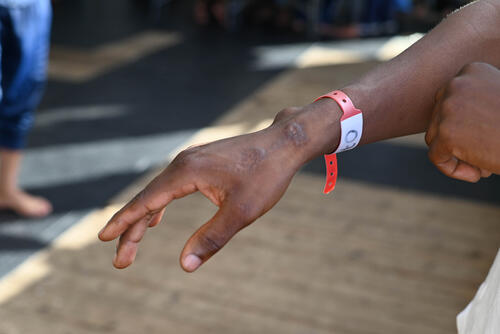Amsterdam – Médecins Sans Frontières (MSF) today announces it will end medical activities in Tripoli, Libya, where we provide healthcare to migrants, asylum seekers and refugees held in detention centres and to those living in precarious conditions in urban settings.
The activities will come to an end as of today, while our support in Tripoli to the National Programme on Tuberculosis and at Abu-Setta Hospital for respiratory diseases, will cease at the end of this year.
Our decision to close medical activities in Tripoli follows an extensive review of our humanitarian responses globally and a process of financial reprioritisation.
We regret that we have had to take the difficult decision to end our medical activities in Tripoli... We have not taken this decision lightly.Djoen Besselink, MSF operations manager
MSF initiates medical projects based on specific identified needs of people and the ability to have unhindered access to those we assist. As an organisation with humanitarian responses in over 80 countries we make continuous choices where to focus our work.
“We regret that we have had to take the difficult decision to end our medical activities in Tripoli, knowing that this will have an impact on people’s access to medical care. We have not taken this decision lightly,” says Djoen Besselink, MSF operations manager.
The closure of our medical activities will end assistance to people in detention centres in Tripoli, where since 2016 we have provided general healthcare, including mental health support, referrals of life-threatening conditions to specialist healthcare facilities, and the facilitation of access to protection services.
In addition, we have provided vital care to people through mobile clinics in urban settings and have supported two general healthcare facilities with health promotion, mental health and sexual and reproductive care.
MSF has also supported the National Tuberculosis Programme and Abu Setta Hospital for Respiratory Diseases in Tripoli, to improve the medical response to tuberculosis, including drug-resistant tuberculosis, for both Libyan and non-Libyan people. MSF will continue to work in the Misrata Chest Respiratory Hospital.
MSF remains committed to providing free and quality health services in Libya.Djoen Besselink, MSF operations manager
The announcement is made against the backdrop of access issues that have affected our medical activities in Tripoli along with an increasingly challenging environment for international organisations in the country.
“MSF remains committed to providing free and quality health services in Libya,” says Besselink. “Our work continues in the regions of Misrata and Zuwara, where we provide general healthcare, mental health counselling, and sexual and reproductive healthcare in public health facilities, detention centres, prisons, and urban settings.”
We reiterate our commitment to continue providing medical care and humanitarian assistance in Libya, guided by universal medical ethics and the principles of neutrality, independence, and impartiality.
MSF will continue search and rescue activities to assist asylum seekers, refugees and migrants who risk their lives crossing the central Mediterranean Sea, and advocate for safe pathways for people to seek protection.
MSF began working in Libya in 2011, providing assistance to people affected by the conflict and supporting public health facilities in collaboration with the Ministry of Health (MoH).
In 2022, we provided medical care to more than 50,000 people in Tripoli, Misrata, Az-Zawya, Zuwara, Bani Walid, Nesma, Zletan and Khoms. Our teams provided general healthcare, mental health counselling, and sexual and reproductive health care in public health facilities, detention centres, prisons, and urban settings.







